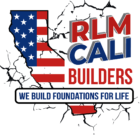Why Concrete Should Be Leveled Before Winter
Snow and freezing rain are just around the corner as we approach winter. Even though many of us like this time of year, it also comes with its fair share of work and anxiety. One thing you should make sure to check as you go through your checklist to ensure that you are prepared for the season is the concrete in your drive or pathway. Consider having the concrete leveled if it has significant cracks or is uneven before the winter truly sets it. Why, though, level concrete before winter?
CONCRETE THAT IS NOT EVEN CAN BE RISKY
It can already be difficult to get from point A to point B when snow and ice start to fall. Adding uneven concrete to the mix essentially makes a trip or fall inevitable. Even when you can see the uneven places, they are considerably easier to slip on since the snow and ice frequently disguise or conceal them. Having your concrete leveled will help you prevent this issue, as well as the costs and inconveniences associated with injuries.
SNOWBLOWING CAN BE A PAIN IF THE CONCRETE IS UNEVEN.
The last thing you want to be concerned about when using your snowblower outside in below-freezing temps is having the machine become stuck or scrape along on the damaged and uneven sections of your driveway. However, any uneven surface will turn your fear become a reality if you can’t see where you’re going. This can make a task that ought to be quite simple twice as difficult. Additionally, it increases the strain on your snowblower.
During the winter, uneven concrete will deteriorate more.
The water from snow and ice will cause significant damage to your concrete when it seeps into the crevices and uneven surfaces. The worst time to ignore concrete problems is during the winter. This action will simply worsen the condition of your concrete since ice expands. What starts out as a minor issue can only worsen with time, requiring much more effort and money to correct.
You can frequently detect where a concrete slab’s level has changed relative to the slabs adjacent to it. Concrete leveling may be able to raise any slab that has sunk at least a quarter-inch from its original level. When it rains, you can also notice water problems in your basement, which are occasionally brought on by concrete patios shifting next to your home.
Other indications are more subtle. Under concrete, voids can form without immediately posing a threat. Look for slabs that rock when trodden on, driven on, or tapped, or that produce hollow noises.
Get a professional to inspect your substructure if you see any damage. Some of the illnesses are purely aesthetic, while others need prompt treatment. You will receive help from a knowledgeable specialist in identifying the underlying causes of numerous problems. The solution is to seek professional assistance. Get a Foundation Inspection Studio City by contacting RLM Retrofit Foundation.










